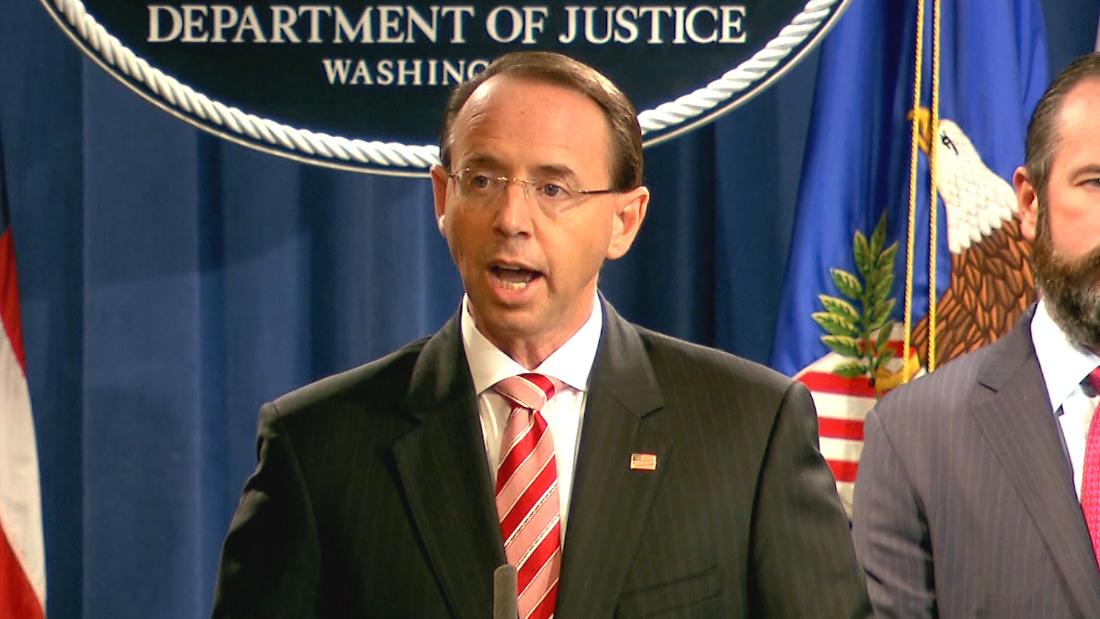[ad_1]
The report, a redacted version of which the Justice Department released Thursday, disclosed a previously unknown episode in which Rosenstein, resisted Trump’s efforts to get him to take the blame for the firing of FBI Director James Comey.
That event was examined as a key piece of Mueller’s investigation of Trump’s possible obstruction of justice, meaning Rosenstein was an important witness in a criminal probe he oversaw beginning in early 2017.
On the night of May 9, 2017, hours after Trump fired Comey, officials in the White House press office called the Justice Department to say the White House “wanted to put out a statement saying that it was Rosenstein’s idea to fire Comey,” according to the report.
Rosenstein told Justice Department officials that he wouldn’t participate in putting out a “false story,” he told the special counsel’s office.
Trump then called Rosenstein directly to say he was pleased with the Fox News coverage Trump was watching, and told Rosenstein he should have a press conference.
“Rosenstein responded that this was not a good idea because if the press asked him, he would tell the truth that Comey’s firing was not his idea,” the report says.
Meanwhile, according to a footnote in the report, the White House chief of staff at that time, Reince Priebus, was “screaming” at the Justice Department’s public affairs office in an attempt to force Rosenstein to conduct a press conference.
Later that evening, the White House press secretary at the time, Sean Spicer, told reporters that, “It was all (Rosenstein). No one from the White House. It was a DOJ decision.” And Sarah Sanders, then a White House spokeswoman, told reporters that Rosenstein decided “on his own” to review Comey’s performance and that Rosenstein decided “on his own” to approach Trump days earlier with “concerns about Comey.”
The next day, Sessions and Rosenstein both told White House counsel Don McGahn of their concern the White House “was creating a narrative that Rosenstein had initiated the decision to fire Comey.”
“The White House Counsel’s Office agreed that it was factually wrong to say that the Department of Justice had initiated Comey’s termination, and McGahn asked attorneys in the White House Counsel’s Office to work with the press office to correct the narrative,” the report says.
Eight days after Comey’s firing, Rosenstein appointed Mueller as special counsel, and less than a week later Rosenstein sat for an interview as a witness.
In its analysis of whether Trump’s firing of Comey was an act of obstruction, the special counsel’s office referenced Rosenstein’s refusal to comply with Trump’s demands.
“Although the President ultimately acknowledged that he was going to fire Corney regardless of the Department of Justice’s recommendations, he did so only after DOJ officials made clear to him that they would resist the White House’s suggestion that they had prompted the process that led to Comey’s termination,” the report says.
“The initial reliance on a pretextual justification could support an inference that the President had concerns about providing the real reason for the firing, although the evidence does not resolve whether those concerns were personal, political, or both.”
Mueller’s report didn’t make a determination on the question of obstruction, saying “while this report does not conclude that the President committed a crime, it also does not exonerate him.”
In defense of Rosenstein, a former Justice Department attorney close to the deputy attorney general noted that even frontline prosecutors and agents don’t recuse themselves from an obstruction investigation unless they determine they are needed as a witness at trial.
But Rosenstein saw the Mueller investigation through to the end. As a symbol of the prominent role he played in the probe, Rosenstein stood alongside Attorney General William Barr during Barr’s Thursday morning news conference about the results of the Russia investigation.
“Rod has been an invaluable partner, and I am grateful that he was willing to help me and has been able to see the special counsel’s investigation to its conclusion,” Barr said. “Thank you, Rod.”
CNN’s Laura Jarrett contributed to this report.
[ad_2]
Source link

